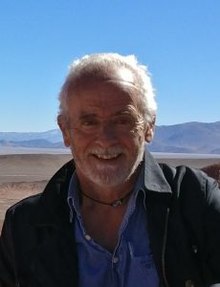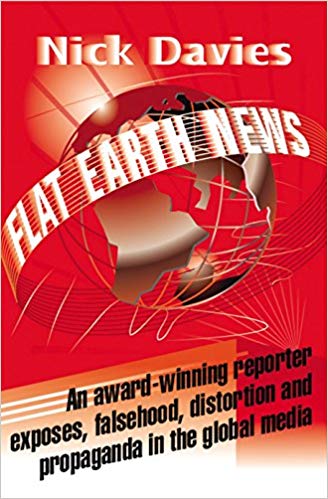
Some readers protest when I attempt to convey a Palestinian perspective or concern that I think deserves to be more widely known and respond by stressing the official Israeli version of events as if that is the real truth and all we need to know. Sometimes I try to respond by explaining that their knowledge is shaped largely by one-sided mainstream media reporting. An elaboration of that same point is made by Nick Davies in Flat Earth News: An Award-Winning Reporter Exposes Falsehood, Distortion and Propaganda in the Global Media by Nick Davies. The link is to a Wikipedia article explaining who Nick Davies is.
There is now a network of pro-Israeli pressure groups who specialise in orchestrating complaints against the media. HonestReporting has offices in London, New York and Toronto and claims to have 140,000 members on whom it can call to drench media organisations in letters and emails. . . . Camera, the Committee for Accuracy in Middle East Reporting in America, uses street demos, pressure on advertisers, formal complaints and email showers. Giyus, Give Israel Your Support, supplies its members with a browser button which they can hit to send them any article which they deem offensive, and software called Megaphone to assist them in launching mass complaints. Memri (the Middle East Media Research Institute), Palestine Media Watch, Bicom (the Britain Israel Communications and Research Centre) and Israeli Embassy staff all supply more energy for the fence. They share aims and⁄or funding sources with the immensely powerful network of organisations which lobby governments and political parties on behalf of Israel.
The result is that some facts become dangerous: to report Palestinian casualties; to depict the Palestinians as victims of Israeli occupation; to refer to the historic ousting of hundreds of thousands of Palestinians from their homes; to refer to the killing of Palestinian civilians by Zionist groups in the 1940s. The facts are there, but the electric fence will inflict pain on any reporter who selects them. Words themselves become dangerous: to speak of ‘occupied territories’; to describe Palestinian bombers as anything other than ‘terrorists’; to reject the Israeli government euphemism of ‘targeted killings’. Crucially, there is no lobby of similar force on the Palestinian side. The pro-Israeli groups are able to claim numerous victories.
Honest Reporting claims:
‘Since 2000, the organisation prompted hundreds of apologies, retractions, and revisions from news outlets.’
They cite, in particular, their campaign against CNN, which saw them sending up to 6,000 emails a day to the chief executive and which resulted in their being invited to CNN’s headquarters in Atlanta to meet managers who, they say, ‘showed a genuine sensitivity to HonestReporting’s concerns’. They had complained that CNN was failing to describe Palestinian bombers as ‘terrorists’; that too little attention was being given to Israeli victims; and that CNN had been willing to broadcast videotaped final statements by bombers. Following the meeting, they note, CNN.com started referring to ‘Palestinian terrorism’ and ran a special series on Israeli victims, while the chief executive issued a ban on the use of videotaped statements by bombers. HonestReporting also quotes from transcripts of CNN broadcasts in which the anchor in Atlanta interrupts the correspondent on the ground to put the Israeli case.
HonestReporting also claims credit for Reuters’ decision to stop referring to Hamas as a group seeking an independent state and to describe them instead, for example, as ‘Hamas, sworn to Israel’s destruction’; and for the Washington Post’s decision to change a website headline from ‘JEWISH TODDLER DIES IN THE WEST BANK’ to ‘JEWISH BABY SHOT DEAD ON WEST BANK’ within ninety minutes of HonestReporting starting to complain. The New York Times printed a fulsome apology for publishing a photograph of a pro-Israeli demonstration which showed anti-Israeli protesters in its foreground. A survey by fair.org found that in 90% of references to the Palestinian territories occupied by the Israeli Army, American cable news described them only as ‘contested’ or ‘disputed’ or even as ‘Israel’.
The BBC has been targeted particularly heavily, winning HonestReporting’s annual award for dishonest reporting. One senior journalist there told me:
‘The lobby insinuates a sense of fear. If the editor of the Today programme knows that an item will make the phone ring off the hook, he may think twice about running it. Sure, the lobby works. I can think of numerous examples where I have felt the brunt of it.’
One member of staff at the BBC recalls the former press officer at the Israeli Embassy in London, David Schneeweiss, persuading a Today producer to set up a story about Yasser Arafat’s involvement in corruption, even though BBC correspondents in Israel said there was nothing in it.
‘You get correspondents there who will file a piece about Palestinians and be told by London ‘Nice piece, but it needs an Israeli voice.’
And that would never happen the other way around. Two extensive academic surveys have found that the BBC routinely gives more airtime to Israeli voices than to Palestinian and that it focuses more frequently on Israeli victims than on Palestinians. The judgements are there to be made.
Davies, Nick. 2009. Flat Earth News: An Award-Winning Reporter Exposes Falsehood, Distortion and Propaganda in the Global Media. London: Random House UK. pp. 123f

